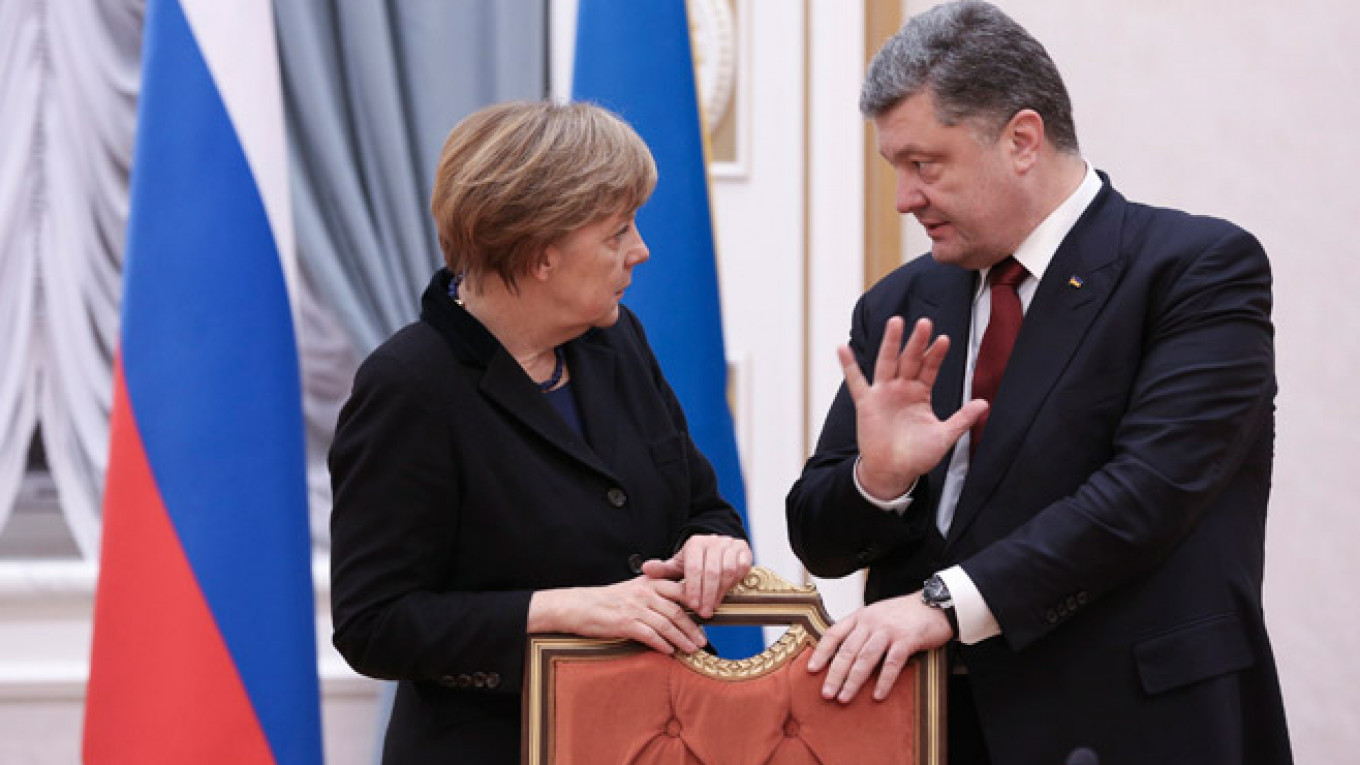Ever since the signing of the Minsk II agreement on Feb. 13, German Chancellor Angela Merkel has had no respite.
As one of the four negotiators in Minsk, the so-called "Normandy Four," Merkel has been on the phone constantly to President Vladimir Putin. She knows the details of the new Minsk agreement inside out. She knows the details of eastern Ukraine's terrain like the back of her hand.
She knows all too well what is at stake if Minsk II ends up like its failed predecessor, Minsk I. It will have immense consequences for Ukraine, for Eastern Europe and for European security.
As for the United States, the administration is already preparing more sanctions on Russia if the cease-fire does not hold.
And although U.S. President Barack Obama has no appetite for such a move, leading Republican senators are leading a call for the United States to deliver weapons to Ukraine, to be used to fight the Russian-backed separatists in the east.
Their view is that a show of force might make Putin back down in eastern Ukraine, or at least show that the West is not prepared to abandon Ukraine and let it end up as a failed state or a dismembered country.
The Republican contingent at the recent Munich Security Conference gave Merkel a very hard time. They could not understand her opposition to sending arms to the Ukrainian military.
But where were the Republicans, or the Obama administration for that matter, when the Ukraine crisis broke out a year ago? Largely absent. Since then, it had been up to Merkel to negotiate with Putin. Indeed, Obama, preoccupied with enough domestic issues and the rise of the Islamic State in the Middle East, gladly delegated the Ukraine crisis to Merkel.
Merkel took on this unenviable role. Who else was prepared to? The EU leadership was in transition. But even its incumbents showed little interest in events in Ukraine and largely failed to grasp the significance of the Maidan movement and Russia's subsequent annexation of Crimea.
The fact that Merkel decided to take on such a role has shown two things. First is that she has tried to change the nature of Germany's relationship with Russia. Second is that she has managed, so far, to keep the European Union together and to present a united front on the highly controversial issue of sanctions against Russia. In both cases, it has been a very tough struggle and it is far from over.
Germany's relationship with Russia is fraught with difficulties. For the past 45 years, it has been based on Ostpolitik, or "Eastern policy," that was promoted by former Social Democrat Chancellor Willy Brandt.
In essence, Ostpolitik was about Germany forging a special, cooperative understanding with the Soviet Union and later Russia. In practice, it meant seeing Eastern Europe through the prism of that special relationship with Russia.
To this day, many German Social Democrats see Ukraine, but also other countries in the region, through that prism.
They are reluctant to abandon Ostpolitik despite the immense changes that have taken place among Germany's eastern neighbors since the fall of the Berlin Wall in 1989. Some are even prepared to justify Putin's annexation of Crimea.
Merkel has been chiseling away at those perceptions. Since becoming chancellor in 2005, she has increasingly focused on Germany's eastern neighbors like Poland and Hungary and even further afield to the Balkans and Moldova.
But with Ukraine, Merkel has taken on the biggest foreign policy challenge, if not the biggest gamble, in her political career.
She has to convince Putin to implement the Minsk II agreement. If the agreement collapses, the situation will escalate — American Republicans could use this as a pretext to send arms to Ukraine and the European Union could slap on more sanctions.
Above all, she has to convince her EU partners that Europe must support Kiev to build a modern and democratic state, no matter what happens in eastern Ukraine.
Unity inside the EU is holding, for now. But several member states, including the Czech Republic, Hungary, Bulgaria, Cyprus and Greece oppose more sanctions on Russia.
What would be left of Europe's soft power or commitment to Ukraine if another round of tougher sanctions were blocked?
Putin will have to make his own calculations as well. The Kremlin's propaganda machine can easily turn the tables on Merkel by tapping into the pro-Russian sympathizers in Germany and elsewhere in Europe. And there are many.
They can easily accuse Merkel of trying to isolate Russia and pushing it into a corner from which it could only escape by using force to defend its national interests.
And Putin too can exploit the divisions inside the EU, whose unity is fragile.
Above all, if the new Minsk agreement fails, the transatlantic relationship will be strained to the breaking point, making Merkel's role in this crisis an unenviable one, and an unenviable burden.
Judy Dempsey is senior associate and editor-in-chief of Strategic Europe at Carnegie Europe.
A Message from The Moscow Times:
Dear readers,
We are facing unprecedented challenges. Russia's Prosecutor General's Office has designated The Moscow Times as an "undesirable" organization, criminalizing our work and putting our staff at risk of prosecution. This follows our earlier unjust labeling as a "foreign agent."
These actions are direct attempts to silence independent journalism in Russia. The authorities claim our work "discredits the decisions of the Russian leadership." We see things differently: we strive to provide accurate, unbiased reporting on Russia.
We, the journalists of The Moscow Times, refuse to be silenced. But to continue our work, we need your help.
Your support, no matter how small, makes a world of difference. If you can, please support us monthly starting from just $2. It's quick to set up, and every contribution makes a significant impact.
By supporting The Moscow Times, you're defending open, independent journalism in the face of repression. Thank you for standing with us.
Remind me later.


